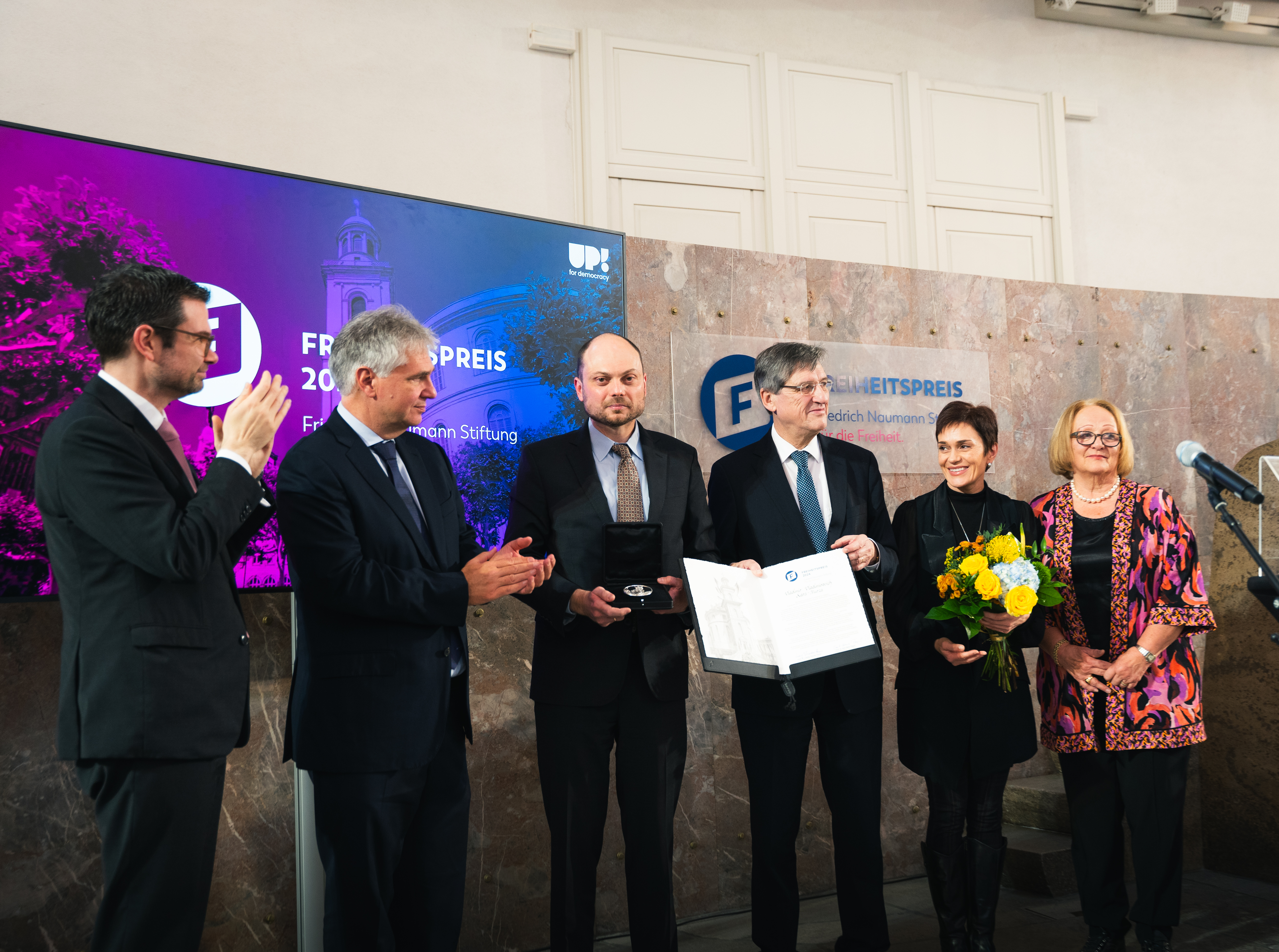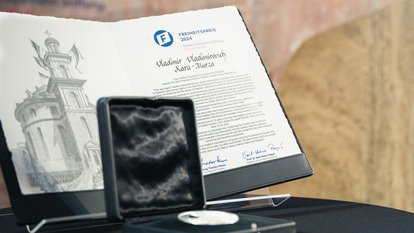Freiheitspreis
Freiheitspreis 2024: Rede des Preisträgers Vladimir Kara-Murza

v.l.n.r.: Dr. Marco Buschmann MdB, Mitglied des Deutschen Bundestages, Bundesjustizminister a. D., Prof. Dr. Ludwig Heuss, Vorsitzender des Kuratoriums, Friedrich-Naumann-Stiftung für die Freiheit, Vladimir Kara-Murza, Russischer Oppositioneller, Aktivist und Journalist, Prof. Dr. Karl-Heinz Paqué, Vorsitzender des Vorstands, Friedrich-Naumann-Stiftung für die Freiheit, Evgenia Kara-Murza und Sabine Leutheusser-Schnarrenberger, Stv. Vorsitzende des Vorstands, Friedrich-Naumann-Stiftung für die Freiheit; Bundesjustizministerin a. D.
© Kian Bonanno, aqua productionAm 16. November 2024 hielt Vladimir Kara-Murza in der Frankfurter Paulskirche eine bewegende Rede anlässlich der Verleihung des Freiheitspreises der Friedrich-Naumann-Stiftung. Als unermüdlicher Kämpfer für Demokratie und Menschenrechte schilderte er eindrucksvoll den Mut derer, die Putins Regime Widerstand leisten, und rief zu internationaler Solidarität auf. Es gilt das gesprochene Wort.
Professor Paqué, Professor Heuss, Dr. Buschmann, Vice-Chair Leutheusser-Schnarrenberger, Your Excellencies, Ladies and Gentlemen. Dear friends.
I first learnt of the Friedrich Naumann Foundation’s decision to award me its Freedom Prize from my lawyer on his weekly visit to see me at the maximum-security prison hospital No. 11 in the city of Omsk. It was in July of this year. I felt deeply humbled, of course – but also totally surreal, locked up in that small room behind the glass separating me from my lawyer. The news sounded like something from a different planet, from some kind of a parallel reality. And I could never imagine that I would be able to receive this award in person.
Today, here in Frankfurt surrounded by friends, I am feeling surreal too – but in a much better way. The prisoner exchange on 1st August that saved 16 human lives from the hell of Vladimir Putin’s modern-day Gulag was historic in many ways. The largest East-West prisoner exchange since the Cold War. A complex multilateral effort coordinated between 8 different countries. The first piece of good news from Russia in a very long time. But what made this exchange truly historic was the fact that Western governments – primarily the government of Germany – insisted that it includes not only their own citizens held hostage by the Putin regime, but also Russian political prisoners – the first exchange of this kind in nearly four decades. The message was loud, clear, and powerful: the free world knows that the real criminals are those people in the Kremlin who have started the war in Ukraine; not those of us who were imprisoned because we had opposed it.
Fotogalerie
Today’s ceremony is also a message. I am, of course, honoured beyond words to be receiving the Friedrich Naumann Foundation’s Freedom Prize. But I view it, first and foremost, as your recognition of all my fellow Russian citizens who have spoken out against the war of aggression in Ukraine – often at the cost of their own freedom.
It is a staggering fact that today’s Russia holds more political prisoners than the whole of the Soviet Union – that’s 15 countries put together – did in its later years, around the mid-1980s. More than 1,300, according to publicly available figures from human rights groups – but, having been inside that system, I can tell you that the actual numbers are much higher. This coming week alone, 217 people will be tried in courtrooms across Russia on politically motivated charges. And the fastest-growing category on Russia’s political prisoner list are the people who have publicly protested against Putin’s war in Ukraine.
These protests have taken different forms. In the case of Alexei Gorinov, a Moscow municipal councilor, it was calling for a minute of silence at his council meeting for Ukrainian children killed by Russian bombs. The price was 7 years in prison. In the case of Maria Ponomarenko, a journalist from Siberia, it was writing the truth about the Russian airstrike on the theatre in Mariupol that left hundreds of civilians dead. The price was 6 years in prison. In the case of Dmitry Ivanov, a talented young mathematician who was arrested on the day of his final exam at Moscow State University before he could graduate, it was posting on social media about war crimes committed by Russian forces in Bucha and elsewhere in Ukraine. The price was 8½ years in prison. And the list goes on – too many names than could be mentioned here.
But I will mention one more. Arseny Turbin, a schoolboy from the Orel Region, was 15 years old when he was arrested for printing out leaflets criticizing Vladimir Putin and putting them in the mailboxes of his neighbours in his apartment building. Last week, the Military Appeals Court of the Russian Federation has finalized his sentence: 5 years in a penal colony for underage criminals. 5 years in prison for a schoolboy for printing out leaflets criticizing Putin.
Vladimir Putin wants the world to think that he is extremely popular in Russia. That he is Russia’s national leader – that’s an official phrase coined by Kremlin propaganda. He wants you to think that all Russians back his regime; that all Russians share his imperialist ressentiment; that all Russians support his war. But actions speak louder than words. And the growing numbers of Russian citizens persecuted or imprisoned for opposing this aggression show the true worth of the regime’s claims. In August 1968, as Soviet tanks rolled into Czechoslovakia to crush the Prague Spring, and as Soviet propaganda put up a façade of universal public support for that invasion, 7 people came out onto Red Square in Moscow in a silent demonstration of protest. They weren’t there even 5 minutes; they were beaten, arrested, and herded away almost immediately. But after what they did, no one could say that there was universal approval by Soviet citizens of the invasion of Czechoslovakia. As one Prague journal, Literárne Listy, wrote during those days, “there are now at least 7 reasons for which we will never be able to hate the Russian people”. Today, even according to the dry statistics of police detentions, administrative cases, or criminal prosecutions for anti-war protests in Russia since February 2022, the free world has thousands of such reasons.
But it’s not only the people who are in jail. It is impossible to judge the true state of public opinion in a country that imprisons you for expressing it – but we do sometimes get glimpses into how many Russians actually feel about Putin and about his war. One such glimpse came in February of this year when, amid the staged circus and total unanimity of our so-called “presidential election”, one candidate – a lawyer and former member of parliament named Boris Nadezhdin – tried to run on an anti-war platform. The response from the public was unimaginable. That month, almost all of the letters I received in prison were about the hours-long lines that suddenly appeared in cities and towns across Russia – the lines of people waiting to sign the nomination papers to get him on the ballot. Needless to say, he was barred from running, as opposition candidates in today’s Russia invariably are – but that was almost beside the point. Suddenly everyone saw through the lie peddled by Putin’s propaganda about universal support for the regime and for the war. I will never forget the letter one young woman sent me from the Black Sea town of Novorossiisk in the south of Russia. After describing how she waited for hours in a long line of like-minded people – mostly young people – to sign the nomination papers for the anti-war candidate, she wrote: “I never realised how many of us there are.”
This is my Russia. The Russia I love; the Russia I call home. Not the Russia of Vladimir Putin – but the Russia of Boris Nemtsov and Alexei Navalny. Not the Russia of murderers and war criminals in the Kremlin – but the Russia of decent and good-hearted people who oppose them. Not the archaic, repressive, belligerent Russia of today – but a hopeful, peaceful, democratic Russia of tomorrow.
That is a Russia Vladimir Putin does not want you to see. But with events and awards like this one today you are sending a very powerful message of solidarity to all those people in Russia who believe in this vision – and a very important signal of recognition that the only way towards a Europe that would finally be whole, free, and at peace lies through a democratic Russia. I have no doubt that day will come. Let’s work together to bring it a little closer.




